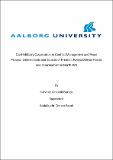Civil-Military Cooperation in Conflict Management and Peace Process: Determinants and Sources of Friction; Kenya Defense Forces and Disarmament in North Rift

View/
Publication Date
2016Author
Calvince Omondi Barack, Abdulkadir Osman Farah
Metadata
Show full item recordAbstract/
This thesis is about the civil-military cooperation in the disarmament exercise carried out by Kenya
Defense Forces in collaboration with other civilian actors in North Rift region in Kenya under the
name Operation Dumisha Amani (Maintain Peace). The thesis has used four key hypothesis to
establish the relationship between the differences in organizational structure, decision making
procedures and information handling practices as well as trust issues on how they impact on the
cooperation between the civilian and the military. The data has been qualitatively collected from the
key informants operating in the region and military officers as well as desk research on how the
differences impacted on cooperation. The organization theory has been used to analyze the different
factors that influence the tendency of organizations to either cooperate or abjure it. Key insights from
the theory including issues of uncertainty based on the differences in core goals, organizational
structures as well as costs and limits set by hierarchies have been discussed. The data has been
presented using frames and the findings have been discussed. Finally, the paper has concluded that
indeed differences in organizational structure, decision making procedures and information handling
procedures as well as trust impacted negatively on cooperation by preventing easy flow and
interaction between the actors. The failure to establish a formal forum for cooperation has particularly
stood out as the most misnomer in the Dumisha Amani operation
